Prize Lecture winners 2015
30 October 2014
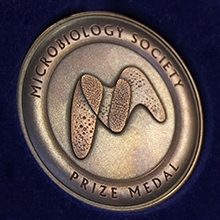
The Society for General Microbiology is delighted to announce the 2015 Prize Lecture Winners. These prestigious prizes are awarded in recognition of significant contributions to areas of microbiology. All the Prize Lecture winners will present a lecture on their work at the Society’s 2015 Annual Conference, to be held 30 March – 2 April in Birmingham.
Prize Medal
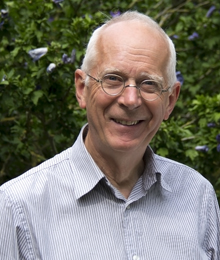 The Society for General Microbiology’s 2015 Prize Medal has been awarded to Sir David Baulcombe, Royal Society Research Professor and Regius Professor of Botany at the University of Cambridge. Sir David was a co-discoverer of the first ‘small interfering RNA’ (siRNA) and showed that these molecules have a role in gene silencing. Sir David’s discovery of siRNAs in plants, while working at the Sainsbury Laboratory, Norwich, has lead to huge advances in the field of medicine. In 2009, Sir David received his knighthood for services to plant science. He was made a fellow of the Royal Society in 2001.
The Society for General Microbiology’s 2015 Prize Medal has been awarded to Sir David Baulcombe, Royal Society Research Professor and Regius Professor of Botany at the University of Cambridge. Sir David was a co-discoverer of the first ‘small interfering RNA’ (siRNA) and showed that these molecules have a role in gene silencing. Sir David’s discovery of siRNAs in plants, while working at the Sainsbury Laboratory, Norwich, has lead to huge advances in the field of medicine. In 2009, Sir David received his knighthood for services to plant science. He was made a fellow of the Royal Society in 2001.
Sir David said of his award: ‘I came into virology without any background, knowledge or relevant experience – I was fascinated with the science and the potential application. The Society for General Microbiology was a great help for such a novice – especially in the early days. It introduced me to the virology community and provided a good platform for our work through the Journal of General Virology and the meetings. It is a great honour to get this award from a Society that I value so much.’
The Prize Medal is awarded to an outstanding microbiologist who is a global leader in his or her field and whose work has had a far-reaching impact beyond the discipline of microbiology. The recipient is awarded their engraved medal and £1000 at the Society’s Annual Conference.
Marjory Stephenson Prize
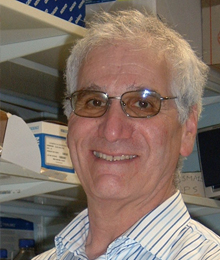 The 2015 Marjory Stephenson Prize has been awarded to Robin Weiss, Emeritus Professor of Viral Oncology at University College London (UCL). Robin has made an outstanding contribution to microbiology and is recognised for his pioneering work on retroviruses, particularly endogenous retroviruses and the identification of CD4 as a co-receptor for HIV-1, HIV-2 and SIV. During his career, Robin has been Director of the Institute of Cancer Research and has managed an international HIV Vaccine Discovery Consortium, funded by the Bill & Melinda Gates Foundation. Robin was President of the Society for General Microbiology between 2006 and 2009.
The 2015 Marjory Stephenson Prize has been awarded to Robin Weiss, Emeritus Professor of Viral Oncology at University College London (UCL). Robin has made an outstanding contribution to microbiology and is recognised for his pioneering work on retroviruses, particularly endogenous retroviruses and the identification of CD4 as a co-receptor for HIV-1, HIV-2 and SIV. During his career, Robin has been Director of the Institute of Cancer Research and has managed an international HIV Vaccine Discovery Consortium, funded by the Bill & Melinda Gates Foundation. Robin was President of the Society for General Microbiology between 2006 and 2009.
Robin said of his award: ‘I feel truly honoured to be chosen to give the Marjory Stephenson Prize Lecture. It is exactly 50 years since I started to study retroviruses while a PhD student, and having recently retired from active laboratory research this recognition is a lovely cap to my career.’
The Prize is named after Society founding member and former President Marjory Stephenson (1947-1948). The Prize is awarded to an individual who has made exceptional contributions to the discipline of microbiology. The recipient is awarded £1000.
Unilever Colworth Prize
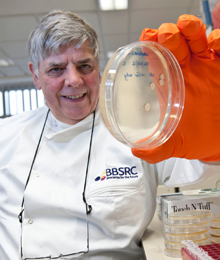 The 2015 Unilever Colworth Prize has been awarded to Professor George Lomonossoff from the John Innes Centre, Norwich. The prize, awarded to a researcher who has demonstrated outstanding contribution to translational microbiology, recognises George’s work developing the CPMV-HT protein expression system, which allows plants to become ‘bioreactors’, capable of producing molecules like antibodies of vaccines. In 2012, George was co-awarded the BBSRC’s ‘Innovator of the Year’ prize, for his work on the system.
The 2015 Unilever Colworth Prize has been awarded to Professor George Lomonossoff from the John Innes Centre, Norwich. The prize, awarded to a researcher who has demonstrated outstanding contribution to translational microbiology, recognises George’s work developing the CPMV-HT protein expression system, which allows plants to become ‘bioreactors’, capable of producing molecules like antibodies of vaccines. In 2012, George was co-awarded the BBSRC’s ‘Innovator of the Year’ prize, for his work on the system.
George responded: I am very honoured to receive this award and would like to pay tribute to all my colleagues who have worked with me over many years for contributing to the work which led to it.’
The Prize is sponsored by Unilever Research’s Colworth Laboratory.
Fleming Prize
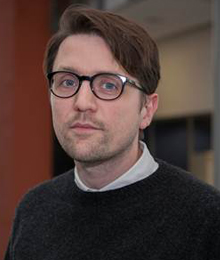 The 2015 Fleming Prize is awarded to Mike Brockhurst, Professor of Evolutionary Biology at the University of York, in recognition of his exceptional research on the evolutionary biology of microbes. As part of a long-standing project, Mike has shown that Pseudomonas aeruginosa populations are more genetically diverse within a cystic fibrosis patient, than between patients. In other work, Mike is investigating how subinhibitory levels of antibiotics lead to evolutionary diversification among microbes.
The 2015 Fleming Prize is awarded to Mike Brockhurst, Professor of Evolutionary Biology at the University of York, in recognition of his exceptional research on the evolutionary biology of microbes. As part of a long-standing project, Mike has shown that Pseudomonas aeruginosa populations are more genetically diverse within a cystic fibrosis patient, than between patients. In other work, Mike is investigating how subinhibitory levels of antibiotics lead to evolutionary diversification among microbes.
Mike said of his award: ‘It is a very great honour to be awarded the Fleming Prize - its prestigious history and the calibre of the past winners certainly set a very high standard to live up to! As an evolutionary biologist I also see this award as recognition of the exciting interdisciplinarity of microbiology research today. Finally, I wish to thank all of the exceptional scientists with whom I have collaborated over the past decade, most especially the students and postdocs who have made the doing of the science such a pleasure.’
The Prize is named after Sir Alexander Fleming, founder and first President of the Society for General Microbiology (1945-1947), and is awarded to an early career researcher who has achieved an outstanding research record. The recipient is awarded £1000.
Peter Wildy Prize
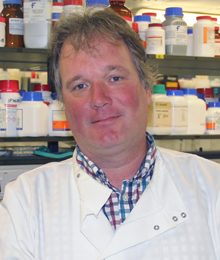 The 2015 Peter Wildy Prize has been awarded to Dr Simon Park from the University of Surrey, in recognition of his outstanding work in the area of scientific communication. Simon has developed a national and international reputation for using art, and collaborating with artists, to promote the understanding of microbiology. His projects include working with artist Jo Wonder to recreate a version of John Everett Millais’s painting Ophelia using pigmented bacteria, and working with artist Anne Brodie to create a ‘Bioluminescent Photobooth’, which appeared in both the Science Museum and the Royal Institution. Simon has recently received funding from the UK Arts and Humanities Research Council to study the microbiology of a 300-year-old copy of Ovid’s Metamorphoses.
The 2015 Peter Wildy Prize has been awarded to Dr Simon Park from the University of Surrey, in recognition of his outstanding work in the area of scientific communication. Simon has developed a national and international reputation for using art, and collaborating with artists, to promote the understanding of microbiology. His projects include working with artist Jo Wonder to recreate a version of John Everett Millais’s painting Ophelia using pigmented bacteria, and working with artist Anne Brodie to create a ‘Bioluminescent Photobooth’, which appeared in both the Science Museum and the Royal Institution. Simon has recently received funding from the UK Arts and Humanities Research Council to study the microbiology of a 300-year-old copy of Ovid’s Metamorphoses.
Simon said of his award: “Over the past eight years, I have been involved in many projects that have used combinations of art and science, as a novel means to stimulate learning and public engagement in microbiology. I am delighted to be chosen as a recipient for this national prize, and honoured to be small part of Peter Wildy’s continued influence upon microbiology education. I intend to put the prize to good use, to fund and support future art and microbiology projects.”
The prize is named after distinguished virologist and teacher Peter Wildy, who was President of the Society for General Microbiology from 1978 to 1981. The recipient of the Prize receives £1,000 and the opportunity to publish in Microbiology Today, the Society’s quarterly magazine.
The Society’s 2015 Annual Conference will be held 30 March – 2 April in Birmingham, which you can find out more about by clicking here.
Image: First image is Sir David Baulcombe, University of Cambridge. Second image Professor Robin Weiss, Microbiology Society. Third image Professor George Lomonossoff, John Innes Centre. Fourth image Professor Mike Brockhurt, University of York. Fifth image Dr Simon Park, University of Surrey. .


